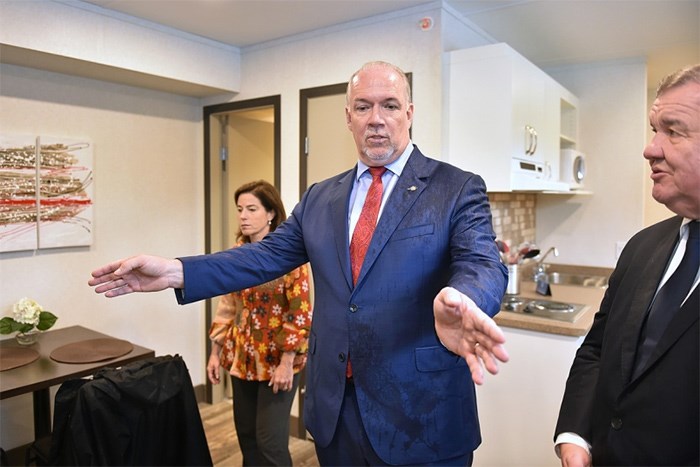 Premier John Horgan, along with cabinet ministers Selina Robinson and Shane Simpson, toured a modular housing display suite Friday at Robson Square. Photo Dan Toulgoet
Premier John Horgan, along with cabinet ministers Selina Robinson and Shane Simpson, toured a modular housing display suite Friday at Robson Square. Photo Dan Toulgoet
Premier John Horgan announced Friday that Â鶹´«Ă˝Ół»will get $66 million to build and operate up to a dozen modular housing complexes that will have enough room to house at least 600 homeless people.
Horgan made the announcement during his closing address at the Union of B.C. Municipalities conference at the Â鶹´«Ă˝Ół»Conference Centre, where Mayor Gregor Robertson was in attendance to hear the news.
“The premier confirming that Â鶹´«Ă˝Ół»will get 600 modular housing units is fantastic news on our goal to tackle homelessness,” Robertson told the Courier outside the hall where Horgan spoke to a large crowd of politicians and municipal staff. “It’s a huge boost.”
The mayor and city officials had been waiting for the government to reveal which municipalities were to receive some of the $461 million announced Sept. 11 for the construction and operation of 2,000 modular housing across the province.
Now city staff will work with the government’s housing branch — B.C. Housing — to find enough land to build the complexes, which will have an average of 50 self-contained units per building.
City and B.C. housing officials told the Courier that a combination of city and private land will be set aside for the complexes, which will be built by Horizon North, the company responsible for the city’s first modular housing project at Main and Terminal.
A model of a suite is on display at Robson Square, where Horgan, the mayor and other members of the premier’s cabinet gathered after the UBCM conference to tour the mobile home-like living space.
Gil Kelley, the city’s director of planning, told the Courier last week the modular housing will not be built in single-family districts or, most likely, not in industrial zones. Staff is focused on multi-family and commercial zones, with the homeless camp on city land near the B.C. Sugar Refinery a possible site.
City council recently passed a bylaw to allow Kelley to expedite the process to get the housing built and opened, without each project having to go through a rezoning and subsequent public hearing.
City staff first revealed it needed 600 modular housing units during a presentation in the summer to city council. The goal, at the time, was to have the units built and open before winter arrives.
The mayor said he was hopeful that some of the complexes would be open before the end of the year. What Robertson didn’t hear in Horgan’s speech was whether the provincial government would provide funding for up to 300 winter shelter beds.
Historically, the city and the previous provincial government have sparred over the need for the funding for shelters, with former housing minister Rich Coleman eventually providing operating funds for most of the shelters and providing rent supplements for homeless people.
The Courier asked Horgan in a scrum following his speech whether the government will fund the shelters, but he didn’t provide a direct answer. Over the years, the winter shelters have quickly filled up, forcing operators to turn away homeless people. Last year, the city opened community centres to handle the overflow.
The city is also waiting to see how much of the $208 million the government promised for more than 1,700 new units of affordable housing will go to Vancouver.
“We’ll know more in the weeks ahead,” Robertson said. “That’s the combo we need — the modular is a great near term solution while we build the permanent.”
Horgan’s announcement came the same week that the Metro Â鶹´«Ă˝Ół»homeless count revealed a 30 per cent region-wide increase in homelessness since 2014. Vancouver, with 2,138 homeless, was the largest in the region, followed by Surrey (602), Langley (206), New Westminster (133) and Maple Ridge-Pitt Meadows (124).
Read more from the


